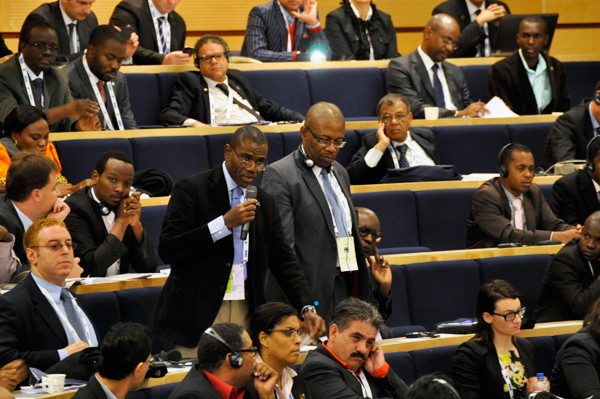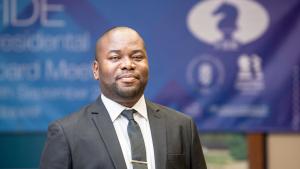
FIDE's African Gambit
October 3 will not only see the elections for a new FIDE president, but also that of the leadership of the chess continents Africa, America, Asia, and Europe. Alessandro Parodi reports on the situation in Africa.
Ahead of the FIDE presidential elections in Batumi, Georgia on October 3, all eyes are on candidates Kirsan Ilyumzhinov, Georgios Makropoulos, Nigel Short and Arkady Dvorkovich. Meanwhile, national and continental federations are ready to make their moves to secure a comfortable spot in the reconstruction of an organization which lies in a problematic state. With its 47 federations, the African Chess Confederation (ACC) will play a crucial role in the outcome of the vote.
The FIDE elections will happen concomitantly with the elections for the ACC and all other continents. The rule is 'one nation, one vote', in the purest spirit of equality of FIDE. Because of the importance of each vote, African federations were caught in the middle of violent power games during the 2014 elections in Tromsø, Norway. The ACC had two simultaneous elections leaving African chess leaders in complete disarray.
Furthermore, multiple scandals arose around the alleged creation of proxy federations in Gabon (2014) and Kenya (2015) and, seemingly, the bribery of a few officials bought with plane tickets for national teams to the Olympiad.
However, the rule 'one nation, one vote', protects the rights of small federations. "Every federation pays the same dues," says Daaim Shabazz, editor of The Chess Drum. "Equal members should have equal powers and equal votes, as in the case of the United Nations. If small countries had no power, nobody would ever pay attention to them. The problem is that federations have their own interest swayed by somebody's promises. The African Chess Confederation needs strong leadership to engage with FIDE."
The prospects for the 2018 FIDE and ACC elections leave some room for hope. Chess in Africa is experiencing an incredible boom, which is seen in higher numbers of players registered with FIDE, a substantial growth of international events and a continental leadership which is consolidating despite the unfortunate cases of alleged misrule and corruption highlighted above. On a political level, Africa rose its voice in the figure of the current ACC president Lewis Ncube (Zambia) and FIDE vice president Jaime Aguinaldo (Angola).
Critics, however, argue with the records of the two politicians:
A little foretaste of what FIDE can expect from a Makropoulos presidency - his V.P. running mate, Dr. Aguinaldo Jaime, in the cross hairs of the #US Senate and Human Rights Watch (@hrw) corruption investigations https://t.co/nHd0UxTO8H pic.twitter.com/uR0r9qoaep
— Nigel Short (@nigelshortchess) June 12, 2018
In 2014, 13th world champion Garry Kasparov was a presidential candidate. His legacy in Africa, in the form of the Kasparov Chess Foundation for Africa, brought new life to the chess peripheries of the continent with funds and the constant sharing of know how.
Three contenders have announced their candidacy for the ACC chair so far, making African chess enthusiasts positive for a vibrant debate which, in the next five months, will focus on governance, accountability and development as meters of the development of the confederation. They are the incumbent president Lewis Ncube (Zambia), Essis Essoh (Ivory Coast) and Tshepo Sitale (Botswana).
Lewis Ncube
The current ACC president, Lewis Ncube, is a controversial figure. His outstanding resume as a leader of what is possibly the strongest chess federation in sub-Saharan Africa, Zambia, adds up to the credentials of an experienced politician and respected collaborator of the current president of FIDE, Kirsan Ilyumzhinov.

Lewis Ncube from Zambia is the incumbent ACC president.
However, Ncube's aficionados list is getting shorter following the drop of Ilyumzhinov's popularity and as a consequence of unresolved issues regarding transparency in the ACC. The latest scandal revolves around FIDE's investment of $30,000 to establish the offices of the confederation in Johannesburg, South Africa. The project never took off, which greatly affected Ncube's international credibility. FIDE's presidential board commented in April:
"It was agreed that the loan had not been fully used for the purposes requested; that there was no proof in any way as to how the loan was used; that the other board members of the ACC had not been advised of the loan until late 2017; that there was a delay of 29 months from the initial promised date of repayment; and that the loan was only repaid when the fact of the loan was became public knowledge. It was therefore agreed that the remainder of the FIDE Development Budget for Africa would be handled by the Treasurer and the Executive Director."
Unfortunately, serious personal problems made president Ncube unavailable to be interviewed and respond to allegations of his misuse of public funds.
Essis Essoh
Riding the wave of Nigel Short's candidacy and a growing call for radical change from federations worldwide, Essis Essoh started campaigning last month with the support of countries like Nigeria and Kenya, where the unrest against the current ACC administration is most accentuated.

ACC presidential candidate Essis Essoh was involved in a heated argument during the 2014 General Assembly
Essis Essoh is relatively new to the dynamics of sports administration, but he has on his side an unmatchable reputation as a highly educated officer of the United Nations with outstanding morals. Essoh is also the main advocate of the rights of developing countries within FIDE and was involved in a heated argument with Makropoulos in 2014 regarding legality and accountability. During the 2014 FIDE elections, he openly supported Kasparov's campaign and backed his vision for the continent.
"I have a high opinion of Essoh," affirmed Short, who recently undertook a chess tour of Africa. "He stands against corruption and he matches my line of thinking. If elected, he will have to work towards three priorities in local administration: statutes, elections and accounts."
Discussing his prospects for Africa, Short emphasized: "I hope that people can see beyond their narrow interest. I would give the continent huge priority and take advantage of a great deal of untapped enthusiasm in Africa."
As a #Liberian chief
— Nigel Short (@nigelshortchess) June 14, 2018pic.twitter.com/LrqF2FBCbu
Former chess Kenya chairman Githinji Hinga added: "Good leadership can resolve in more numbers, efficiency, less costs and better players. Essoh ran his federation [Ivory Coast - AP] perfectly and he is a benefactor. With a team of like-minded people, he can initiate a positive synergy which will prompt federations to have targets and activities."
"You don't succeed alone", explained Essoh. "I want to call people around me, discuss the issues, diagnose and come up with prognosis." A public policy analyst, Essoh believes in a drastic change of the ACC structure: "I have the requisites to make the ACC politically, administratively and economically independent, and able to engage with all federations. Wise investments and rational investments lead to returns, as it happened with Kasparov's investments in Ivory Coast."
Essoh also believes in the power of chess to promote equity and development in the south of the world: "We are behind, but we can learn fast. Chess is a truly democratic game and we are using it to change age and gender relations in Africa. Now it is time to increase our opinion of our federations and to stop excusing our laziness".
Tshepo Sitale
Makropoulos' supporters believe in a transitional term to steer FIDE back on track rather than shaking a boat loaded with ill governance at the risk of sinking it down. Many federations will make a cautious choice and support a well known administrator instead of a rampageous game changer. Their choice for the ACC is Tshepo Sitale, the president of the Botswana Chess Federation between 1998 and 2013, an experienced sports administrator and an ACC veteran.

Tshepo Sitale: an experienced sports administrator and an ACC veteran.
ACC deputy president Hesham Elgendy (Egypt), who was in Ncube's slate in 2014, said about Sitale: "He has my support, as he is a friend and a very active administrator. He also has great credentials because he is in the Botswana Olympic Committee and in FIDE."
"We immediately need to work on the ACC being self sustainable", stated Sitale, "and that calls for us to open our bank account so we can have income, have ACC’s Verification Commission to safe guard any chance of financial misuse and have a player’s commission that advices the ACC board on chess development. From the side of ACC members, we need to build capacity in the federation and increase FIDE rated events, as well as have programs in place for top players to have opportunity to become IMs and GMs."
Sitale's vision is for a more structured ACC and for quicker delivery: "We must develop a Strategic Plan for ACC (2018-2022) that will be adopted by all Federations and implementation funded with part of Development Commission budget which is 40% of DEV budget," he wrote in his manifesto.
Sitale added: "Key to the growth of chess in Africa is the need to engage as players, Federations and at international Level FIDE, so that the interest of each stakeholder is represented. I have proposed that there be a Players Commission whose representative will seat on ACC Board to safe-guard the interest of players.
"We need to have centres of Excellence in our Zones where players from neighbouring countries can have access to high level coaching and training; we need to have mass participation in chess and from the mass people, identify talented players and give them opportunity to grow and nurture their talent; we have to establish a Grant that will help top players with airfares and living expenses as they attend top European chess events and on the other hand increase FIDE recognised events in Africa."
Together with the other continental associations, the African Chess Confederation will elect a president, a deputy president and four representatives to the FIDE Executive Board. Each continental president is also a member of the FIDE Presidential Board. The elections will take place during the Batumi Olympiad.

